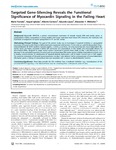Mostrar o rexistro simple do ítem
Targeted gene-silencing reveals the functional significance of myocardin signaling in the failing heart
| dc.contributor.author | Torrado, Mario | |
| dc.contributor.author | Iglesias Reinoso, Raquel | |
| dc.contributor.author | Centeno, Alberto | |
| dc.contributor.author | López, Eduardo | |
| dc.contributor.author | Mikhailov, Alexander T. | |
| dc.date.accessioned | 2016-11-09T12:09:21Z | |
| dc.date.available | 2016-11-09T12:09:21Z | |
| dc.date.issued | 2011 | |
| dc.identifier.citation | Torrado M, Iglesias R, Centeno A, López E, Mihailov AT. Targeted gene-silencing reveals the functional significance of myocardin signaling in the failing heart. PLoS ONE [Internet]. 2011 Oct 18 [acceso 2016 Nov 9];6(10):e26392 | es_ES |
| dc.identifier.issn | 1932-6203 | |
| dc.identifier.uri | http://hdl.handle.net/2183/17528 | |
| dc.description | Research article | es_ES |
| dc.description.abstract | [Abstract] Background. Myocardin (MYOCD), a potent transcriptional coactivator of smooth muscle (SM) and cardiac genes, is upregulated in failing myocardium in animal models and human end-stage heart failure (HF). However, the molecular and functional consequences of myocd upregulation in HF are still unclear. Methodology/Principal Findings. The goal of the present study was to investigate if targeted inhibition of upregulated expression of myocd could influence failing heart gene expression and function. To this end, we used the doxorubicin (Dox)-induced diastolic HF (DHF) model in neonatal piglets, in which, as we show, not only myocd but also myocd-dependent SM-marker genes are highly activated in failing left ventricular (LV) myocardium. In this model, intra-myocardial delivery of short-hairpin RNAs, designed to target myocd variants expressed in porcine heart, leads on day 2 post-delivery to: (1) a decrease in the activated expression of myocd and myocd-dependent SM-marker genes in failing myocardium to levels seen in healthy control animals, (2) amelioration of impaired diastolic dysfunction, and (3) higher survival rates of DHF piglets. The posterior restoration of elevated myocd expression (on day 7 post-delivery) led to overexpression of myocd-dependent SM-marker genes in failing LV-myocardium that was associated with a return to altered diastolic function. Conclusions/Significance. These data provide the first evidence that a moderate inhibition (e.g., normalization) of the activated MYOCD signaling in the diseased heart may be promising from a therapeutic point of view. | es_ES |
| dc.description.sponsorship | Ministerio de Ciencia e Innovación; AF2008-00337 | es_ES |
| dc.description.sponsorship | Galicia. Consellería de Economía e Industria; 8CSA008161PR | es_ES |
| dc.language.iso | eng | es_ES |
| dc.publisher | PLoS | es_ES |
| dc.relation.uri | http://dx.doi.org/10.1371/journal.pone.0026392 | es_ES |
| dc.rights | Atribución 3.0 España | es_ES |
| dc.rights.uri | http://creativecommons.org/licenses/by/3.0/es/ | * |
| dc.title | Targeted gene-silencing reveals the functional significance of myocardin signaling in the failing heart | es_ES |
| dc.type | info:eu-repo/semantics/article | es_ES |
| dc.rights.access | info:eu-repo/semantics/openAccess | es_ES |
| UDC.journalTitle | PLoS One | es_ES |
| UDC.volume | 6 | es_ES |
| UDC.issue | 10 | es_ES |
Ficheiros no ítem
Este ítem aparece na(s) seguinte(s) colección(s)
-
GI- GRINCAR - Artigos [216]






